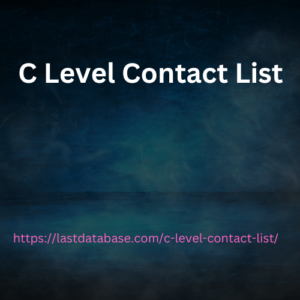Post by account_disabled on Dec 20, 2023 4:21:55 GMT -4
How You Write The language written on your website is just as important as the language spoken in your direct relationship with your customers. So try: Don't use interrogative forms. When a customer enters your website, he or she must feel confident that they have made the right choice. So don't let him think otherwise. Instead of asking do you want it? Use the phrase You Gotta Have It instead of writing If you are interested in our offer please call us , use the slogan Call Us! . You must be tough when doing business, not weak.
Avoid stylistic and spelling errors. It's obvious, but if the red underlined text editor doesn't C Level Contact List help you, if you're unsure about anything, ask your Polish teacher or . Not everyone is a Dear Sir, I myself sometimes write things in such a way that I'm not sure if it sounds right. Written in simple language. Visitors to your website want information that is specific and, most importantly, readable. It should be short, concise, and to the point. Omitting or limiting specialized details that tend to hinder rather than provide valuable information.

Publishing long product descriptions filled with technical nuances may prove to be shooting yourself in the foot. Speak your customers’ language and shorten the distance. I assume you know your target group, so you know how to talk to them. Go directly to the customer. One of the great nightmares in copywriting is the problem of writing or . Personally I think the second form is definitely better. This is especially true if you want the customer to know that you understand his needs and are being honest.
Avoid stylistic and spelling errors. It's obvious, but if the red underlined text editor doesn't C Level Contact List help you, if you're unsure about anything, ask your Polish teacher or . Not everyone is a Dear Sir, I myself sometimes write things in such a way that I'm not sure if it sounds right. Written in simple language. Visitors to your website want information that is specific and, most importantly, readable. It should be short, concise, and to the point. Omitting or limiting specialized details that tend to hinder rather than provide valuable information.

Publishing long product descriptions filled with technical nuances may prove to be shooting yourself in the foot. Speak your customers’ language and shorten the distance. I assume you know your target group, so you know how to talk to them. Go directly to the customer. One of the great nightmares in copywriting is the problem of writing or . Personally I think the second form is definitely better. This is especially true if you want the customer to know that you understand his needs and are being honest.
